Good news, everyone!
So, last week’s blog was pretty intense. It was really long and did a number on me. Not just intellectually, but it also messed with my life, too. For those who don’t know, last week’s blog was my review of the Enneagram. You can read it here. But, anyway, because last week’s blog was so long and intense, this week I’m going to keep things light and simple. Originally, I struggled with what I was going to blog about, but after a couple of minutes on Instagram looking at memes about INTJs, this week’s topic came to me quite easily. This week will be a double feature! What dog breed are INTJs and why do INTJs hate themselves?
The dog one was inspired by a meme I saw that was called “MBTI Types as Dog Breeds”, which got INTJs wrong, hence why I’m writing about it. And I saw several comments on other memes where several INTJs proclaimed self-loathing, so I simply had to write about these two issues. Let’s get into it.
First Feature
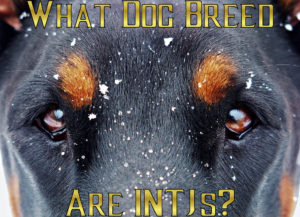
So, as I said, I saw a meme titled “MBTI Types as Dog Breeds”. I’m not going to name the IG profile that posted it, but they claimed INTJs are Dachshunds, along with INFJs. They then claimed that Dachshunds/INTJs/INFJs are reserved, gentle, and nurturing. Now, I’m fairly certain all the INTJs in the audience, as well as all the INFJs, just shouted “What?!”
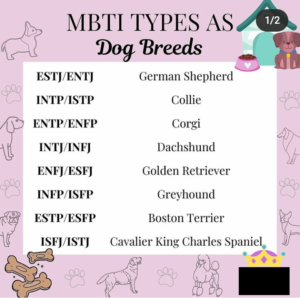 Now, I wasn’t the only person who took umbrage with this claim—many INTJs did. And to this claim, I left the comment “Bitch, are you trying to start a fight?!” which may have been a little more off-sides than I intended as I think the profile host is actually a woman. Anyway, the host commented with her disbelief as to why so many INTJs hate being grouped with INFJs. She then explained herself saying that because both types have Ni as their primary function, both types were therefore chilled and laid-back, and y’all, I wanted to scream.
Now, I wasn’t the only person who took umbrage with this claim—many INTJs did. And to this claim, I left the comment “Bitch, are you trying to start a fight?!” which may have been a little more off-sides than I intended as I think the profile host is actually a woman. Anyway, the host commented with her disbelief as to why so many INTJs hate being grouped with INFJs. She then explained herself saying that because both types have Ni as their primary function, both types were therefore chilled and laid-back, and y’all, I wanted to scream.
So, I tried to explain that Ni is not a chill or laid-back function. Ni is extremely active. It can definitely be passive at times, but that doesn’t mean it is passive. It’s just allowing the other functions to work up front while it’s working in the background. But Ni is not chill. It’s busy looking for the truth, trying to transcend the mundane world. As a result, it’s very apathetic to what’s happening in the physical world, hence why it may appear chill. It just doesn’t care about what everyone else cares about.
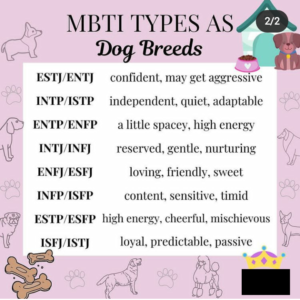 Furthermore, I was ticked because when the host came up with the adjectives describing INTJs, INFJs, and Dachshunds. She came up with reserved, gentle, and nurturing. Are INTJs reserved? Yeah! Are they gentle and nurturing? No! The only time they are is when they’re interacting with their spouse, their children, their pet, or a very close friend. The rest of the time, they are not gentle and nurturing. And this pisses me off because although the host considered the primary function, she did not consider the auxiliary function of either the INFJ or the INTJ, which makes one gentle and nurturing, and the other not.
Furthermore, I was ticked because when the host came up with the adjectives describing INTJs, INFJs, and Dachshunds. She came up with reserved, gentle, and nurturing. Are INTJs reserved? Yeah! Are they gentle and nurturing? No! The only time they are is when they’re interacting with their spouse, their children, their pet, or a very close friend. The rest of the time, they are not gentle and nurturing. And this pisses me off because although the host considered the primary function, she did not consider the auxiliary function of either the INFJ or the INTJ, which makes one gentle and nurturing, and the other not.
For those who don’t know, INFJs have Fe as their auxiliary function and INTJs have Te as theirs. Fe is generally concerned with the well-being and feeling of the group, which would explain why INFJs come off as gentle and nurturing. But with INTJs’ auxiliary function being Te, we are very much the antithesis of gentle and nurturing. That’s not to say that Te can’t be gentle and nurturing, but it’s not in the traditional sense. Te will be gentle if logic and reason dictate that being gentle is the best course of action, but otherwise, it’s only nurturing in a very unusual way. Say someone is down on themselves and whining about how much their life sucks. Well, while Fe will try to comfort that person and make them feel better, Te will try to get them to rationalize their way out of the funk. It’ll ask questions like “Well, how do you know your life sucks?”, “According to whom does it suck?”, “What sort of measure of suck-itude are you using?”, and finally, “Well, if your life doesn’t suck that much, what reason do you have to mope about it?” That’s not a feel good approach.
Lastly, the host asked me what dog breed I thought INTJs should be, and the answer is obvious—Dobermans. You know, intelligent, fiercely loyal, wary of strangers, intense, only let their guard down around those they’re closest to—makes sense to me. And what’s worse is that Dachshunds aren’t gentle and nurturing, either. According to my Encyclopedia of Dog Breeds (which I have because I am a certified dog trainer), Dachshunds are neither of those. The Encyclopedia describes them as independent, bold, and always up for an adventure. They can be reserved with strangers, so that was true, and the independent part nails INTJs, but the rest is wrong.
Second Feature
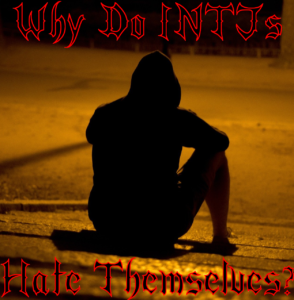
I’m not going to lie; it always saddens me when I see INTJs publicly claiming to hate themselves. I can’t for the life of me understand why. I don’t hate myself. But, if I take an honest look at myself, things aren’t exactly so great either.
If you were to ask me to list all the things I like about myself and all the things I dislike about myself, I’m not sure which list would be longer, but the things I dislike about myself would hit harder. What are some of those things? Well, I’m overweight, I’m broke, and I haven’t done anything worthy of recognition in my life. Now, a sane person would say, “But you have control over all those things. You can change your weight, your account balance, and your life’s achievements.” And that’s the thing—I know I can, and yet, I have not.
It’s no secret INTJs are very critical, but we’re also very critical of ourselves. All the standards we hold other people to, we hold ourselves to. It wouldn’t be fair otherwise. But if I expect everyone else to be fit, rich, and successful, does that not make me a hypocrite for not achieving the same? So, I think that might be the origin of the distaste. It’s also possible that since INTJs expect great things from themselves, but as they see themselves still whiling away the time on small things, they again get down on themselves. They know they can change their life, and they know they can do it at anytime, and yet, they don’t, hence the hate.
Conclusion
So, what have we learned today?
Firstly, for those of you who make those “MBTI Types as X” memes, make sure you consider all of a type’s functions, or at the very least, the top two, especially with Introverts. Due to their being introverted, most people interact with their auxiliary extraverted function, which helps to explain some of the of the more detailed nuances of their personality.
Secondly, if an INTJ hates himself, it is likely due to him feeling like a hypocrite, and failing to meet his own high standards. Other reasons are possible, such as denying one’s inferior function, but generally, most problems with the self can be identified as an inconsistency between personal beliefs versus one’s actual reality. But, hey, as it is said, what is measured is managed. Measure your life and it shall be managed.
What do you think? Did I get this right, or am I missing something? Let me know in the comments below.
Thank you for your patronage.
Follow me on Social Media:
FB: https://www.facebook.com/bryanclaesch
IG: https://www.instagram.com/bryanclaesch/
Twitter: https://twitter.com/BryanofAllTrade
Pinterest: https://www.pinterest.com/bryanclaesch/
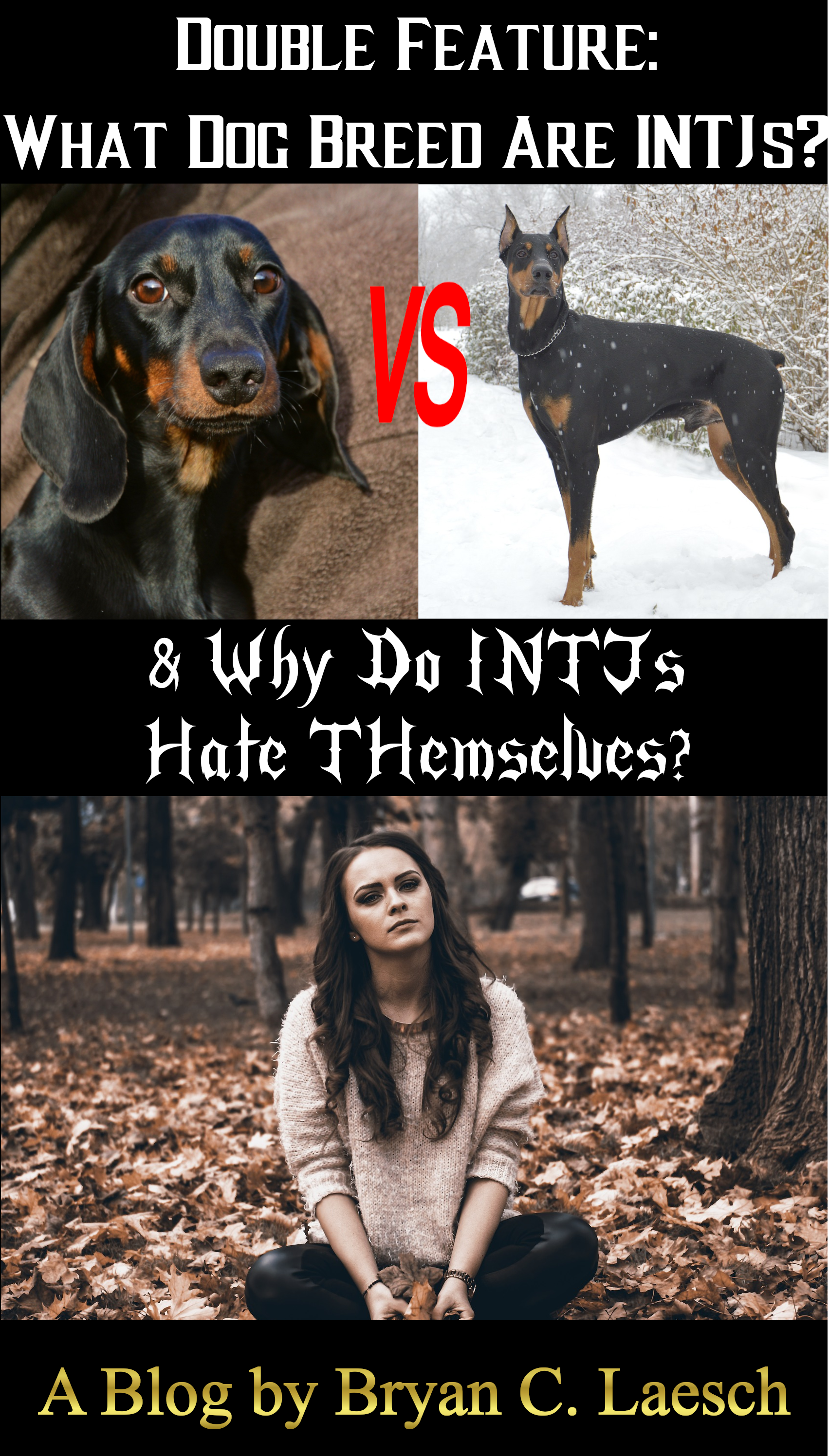
Obrigada.
I don’t know much about dog reputations, but I think you got the self-hate part right. Of course, I also wonder if hating one’s self for hypocrisy and not living up to expectations is truly specific to certain personalities or more of a general rule.
“They know they can change their life, and they know they can do it at anytime, and yet, they don’t, hence the hate.”
When I read your explanation (above), it immediately reminded me of Romans 7:13-21. This line pretty much sums the verses up:
“For the good that I want, I do not do, but I practice the very evil that I do not want.” (Romans 7:19)
The frustration we feel between who we are and who we want to be might just be baked into our DNA… That being said, maybe INTJs feel it more strongly than others. I wonder if it comes from a need for control? Maybe one of those enneagram “forgotten fundamental principles” applies here. I haven’t read the enneagram book you reviewed, but this type 1 description sounds like a person who would struggle especially with imperfection
& hypocrisy:
https://www.enneagraminstitute.com/type-1